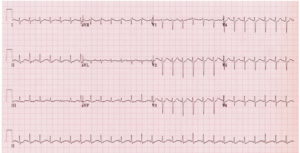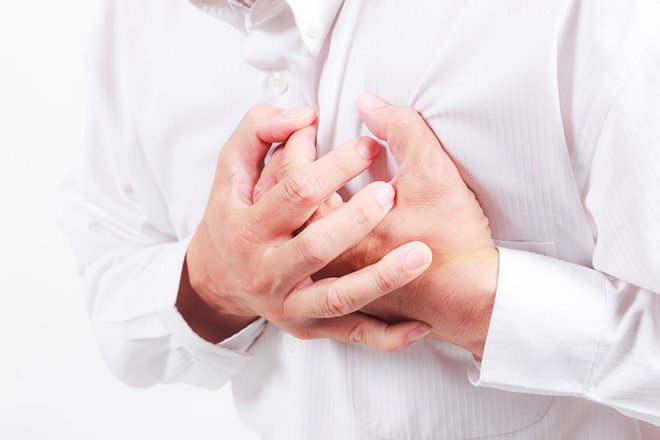Fast sinus rhythm is a condition where the sinus node in the heart is stimulated, causing the heart to beat faster than the normal sinus rhythm. Fast sinus rhythm can cause some adverse symptoms for the cardiovascular system, such as palpitations or shortness of breath, so it is necessary to control and treat fast sinus rhythm promptly and correctly.
1. What is fast sinus rhythm?
Sinus rhythm is defined as the physiological heartbeat of the heart, occurring naturally and generated by the activity of the sinus node located in the right atrium. This structure is likened to the body’s natural pacemaker because it can send electrical signals to the heart muscles, enabling the heart to contract or pump to create beats. For adults, the normal sinus rhythm frequency is 60-100 beats per minute at rest. When there is any abnormality or stimulation, the sinus rhythm frequency can exceed 100 beats per minute and is referred to as fast sinus rhythm; this can be either a physiological or pathological condition depending on the specific case.
The causes of rapid sinus rhythm are due to physiological factors, stimulatory factors, heart conditions, and extracardiac conditions that stimulate the sinus node, leading to an excessive increase in sinus rhythm beyond normal levels. Additionally, other factors can also lead to rapid sinus rhythm, such as vigorous physical activity, physiological causes like anxiety or excessive excitement, young children, female patients or those who are pregnant, and the use of certain medications like corticosteroids, asthma medications, anti-inflammatory drugs, antihypertensives, antiarrhythmics, or extracardiac conditions such as infection, anemia, diarrhea, hypotension, hyperthyroidism, electrolyte disturbances… and cardiac conditions like ischemic heart disease or congenital heart disease can also lead to rapid sinus rhythm.

Some clinical manifestations of rapid sinus rhythm are as follows:
- Sudden rapid heartbeat
- Palpitations, shortness of breath
- Fatigue, anxiety, restlessness
- Nervousness, heart pounding, chest pain
- Dizziness, blurred vision, lightheadedness
- Tremors
- Fainting and syncope
If the patient presents with the above symptoms, rapid sinus rhythm is suspected to be occurring in the body and needs timely treatment, especially for patients with chronic conditions like cardiovascular diseases, hyperthyroidism, COPD, ischemic myocardium, autonomic nervous disorders… as they are more likely to encounter more dangerous complications.
2. Treatment of rapid sinus rhythm
- Some medications for treating tachycardia include anti-arrhythmic drugs such as beta-blockers, calcium channel blockers, Ivabradine, and Amiodarone. Clinically, the most commonly used medication in this case is beta-blockers, aimed at dilating blood vessels as well as inhibiting the formation of compounds that lead to a faster heart rate. This type of medication also helps reduce patients’ stress, anxiety, and balance their emotions. Ivabradine is often prescribed for patients with tachycardia when no cause has been identified. An important principle when using medications for tachycardia is to strictly follow the doctor’s instructions and not to stop taking the medication abruptly, as this can worsen the condition. After the course of medication, if the patient still does not show improvement, doctors may recommend catheter ablation and the placement of a pacemaker thereafter.
- Limit the intake of stimulant foods such as caffeine, alcohol, and tobacco.
- Maintain a nutritious diet containing beneficial substances for the cardiovascular system, such as fiber (green vegetables, fruits…), omega-3 (fish, soybeans, peanuts, walnuts, almonds…), and electrolytes (bananas, spinach, pumpkin, eggs, low-fat milk…). Patients should minimize red meat and foods or drinks high in sugar, as these can increase the likelihood of rapid sinus rhythm.
- Patients need to have a reasonable exercise regimen that matches their physical capabilities, avoiding intense workouts that may cause a rapid heart rate. They can start with gentle exercises and gradually increase the intensity based on their ability.
- Another way to manage rapid sinus rhythm is to use herbal remedies. Khor sam is one of the herbal medicines that can help alleviate the symptoms of rapid sinus rhythm because it contains active ingredients such as Matrine, Oxymatrine, Kurarinone, and Sophocarpine, which help regulate electrolytes, inhibit the production of substances that stimulate a rapid heartbeat, relax the body’s blood vessels, and suppress the release of stress and anxiety-causing hormones in patients.

